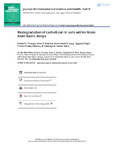Biodegradation of carbofuran in soils within Nzoia River Basin, Kenya

View/
Date
2015Author
Onunga, Daniel O.
Kowino, Isaac O.
Ngigi, Anastasiah N.
Osogo, Aggrey
Orata, Francis
Getenga, Zachary
Were, Hassan
Metadata
Show full item recordAbstract
Carbofuran (2,3-dihydro-2,2-dimethylbenzofuran-7-yl methylcarbamate) has been used within the Nzoia River Basin (NRB),
especially in Bunyala Rice Irrigation Schemes, in Kenya for the control of pests. In this study, the capacity of native bacteria to
degrade carbofuran in soils from NRB was investigated. A gram positive, rod-shaped bacteria capable of degrading carbofuran was
isolated through liquid cultures with carbofuran as the only carbon and nitrogen source. The isolate degraded 98% of 100-mg mL¡1
carbofuran within 10 days with the formation of carbofuran phenol as the only detectable metabolite. The degradation of
carbofuran was followed by measuring its residues in liquid cultures using high performance liquid chromatography (HPLC).
Physical and morphological characteristics as well as molecular characterization confirmed the bacterial isolate to be a member of
Bacillus species. The results indicate that this strain of Bacillus sp. could be considered as Bacillus cereus or Bacillus thuringiensis with
a bootstrap value of 100% similar to the 16S rRNA gene sequences. The biodegradation capability of the native strains in this study
indicates that they have great potential for application in bioremediation of carbofuran-contaminated soil sites
